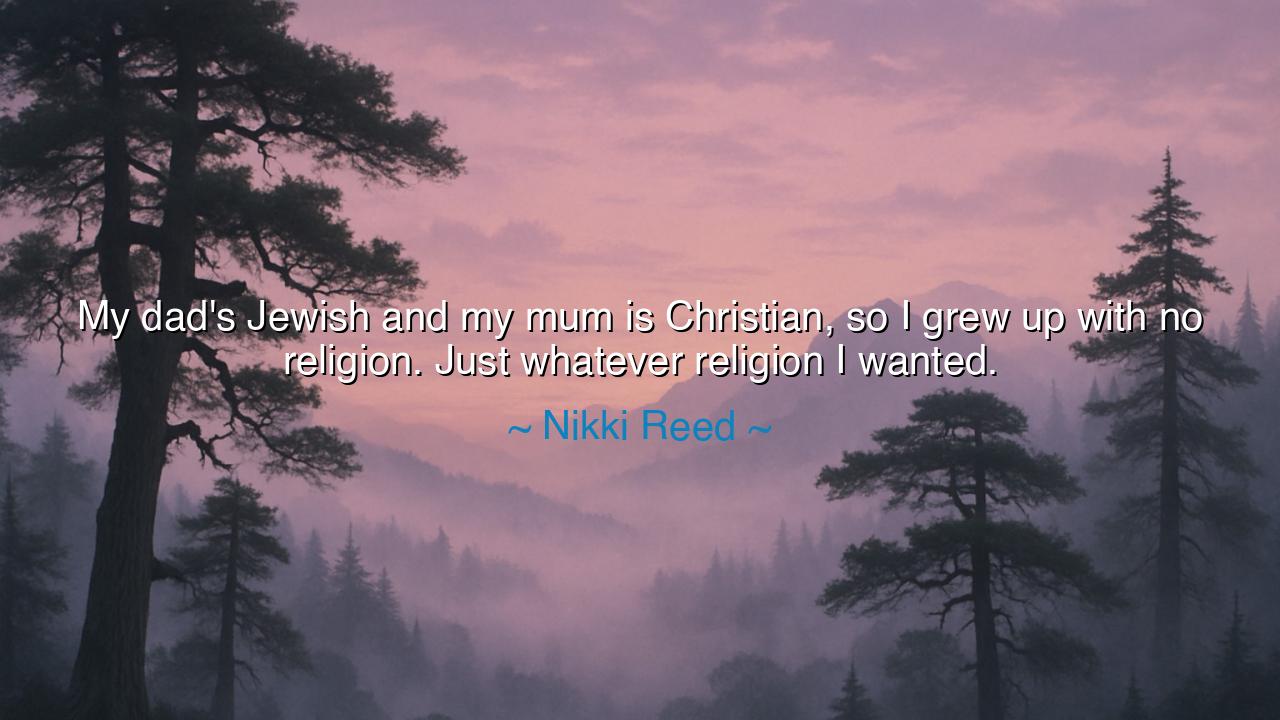
My dad's Jewish and my mum is Christian, so I grew up with no
My dad's Jewish and my mum is Christian, so I grew up with no religion. Just whatever religion I wanted.






"My dad's Jewish and my mum is Christian, so I grew up with no religion. Just whatever religion I wanted." — Nikki Reed
In this tender and contemplative reflection, Nikki Reed speaks of the strange freedom and quiet burden that comes from growing up between two worlds. Her words, though gentle and simple, echo an ancient truth: that identity is both inheritance and choice. When she says, “I grew up with no religion. Just whatever religion I wanted,” she is not proclaiming rebellion but revealing the sacred quest of the human spirit—to seek truth not by inheritance alone, but by discovery. In her upbringing, shaped by both Judaism and Christianity, she found not a single path laid before her, but a vast horizon waiting to be explored.
The origin of this quote lies in Reed’s own background, as the child of two faiths whose histories intertwine yet often stand apart. The Jewish tradition, ancient and enduring, carries the memory of exile and the strength of perseverance. The Christian faith, born from its roots, speaks of renewal and redemption. To be born of both is to stand at a crossroads of millennia—to hear two languages of the soul, both speaking of hope, morality, and divine connection. Yet her parents, instead of choosing for her, gave her something rarer: the freedom to choose her own belief, to let her faith arise from within rather than from command.
This freedom is both a gift and a challenge. For those who inherit a single faith, the path is marked; its rituals, prayers, and stories guide them like the stars that guided their ancestors. But for one who grows in spiritual openness, the path must be forged through experience, reflection, and the courage to wander. Such a soul must listen deeply—to the whisper of the heart, to the wisdom of many traditions, to the quiet truth that binds them all. Nikki Reed’s words remind us that true belief is not born of habit but of awakening—that faith, to be alive, must be chosen, not imposed.
History, too, offers examples of souls who stood between faiths and transformed the world. Consider Marcus Aurelius, a Roman emperor surrounded by the religions and philosophies of his age—pagan ritual, Stoic virtue, mystery cults of the East—and yet he crafted his own moral vision in Meditations, grounded in reason, humility, and reverence for the divine order. Or think of Mahatma Gandhi, who drew wisdom from Hinduism, Christianity, and Islam alike, weaving them into a faith of compassion and nonviolence that transcended all boundaries. Like Nikki Reed, these figures remind us that the essence of religion is not the walls that separate it, but the light that shines through all of them.
To say one has “no religion” is not to live without spirit—it is to dwell in the vastness between definitions, to recognize that all faiths are rivers leading to the same sea. When Reed speaks of “whatever religion I wanted,” she speaks the language of seekers throughout time—those who believe not because they are told to, but because they have seen, felt, and understood. Such freedom requires discernment, for not all roads lead to truth. But it also breeds compassion, for one who walks among many paths learns to see the divine in all forms and faces.
In a world often divided by dogma, this perspective holds quiet power. The child of two faiths can become a bridge between them—a living symbol that the human heart can hold contradiction without conflict, diversity without division. To stand in that place is not to be lost, but to be expanded. It is to understand that faith, at its highest, is not a boundary but a meeting place. As the poet Rumi once wrote, “The lamps are different, but the Light is the same.”
So, my child of the future, take this lesson as your own: let your search for truth be guided by openness, not fear. Honor the faith of your parents, but let your own faith be born through reflection and love. Learn from every path, yet bow to none blindly. For as Nikki Reed reminds us, the greatest religion is not the one given by birth, but the one awakened by the soul. And when you find it—whether in prayer, in silence, or in the simple act of kindness—you will know that the divine has many names, but one heart. The miracle is not in choosing one lamp over another, but in learning to see the same light shining through them all.






AAdministratorAdministrator
Welcome, honored guests. Please leave a comment, we will respond soon